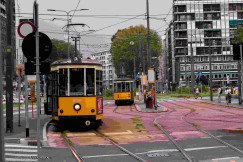Knowledge documents
28 May 2025
EU study on energy efficiency in automated mobility
Knowledge documents
28 May 2025
Urban/city tourism
Multimodal travelling
Sustainable mobility
+2 more
Login / create an account to be able to react
-
56

The new Joint Research Centre study explores how connected, cooperative, and automated mobility affects energy consumption in urban and highway contexts.
Joint Research Centre
Topics
Albania
Armenia
Austria
Belgium
Bosnia and Herzegovina
Bulgaria
Croatia
Cyprus
Czechia
Denmark
Estonia
EU-27
Finland
France
Georgia
Germany
Greece
Hungary
Iceland
Ireland
Italy
Kosovo
Latvia
Liechtenstein
Lithuania
Luxembourg
Malta
Moldova
Montenegro
Netherlands
North Macedonia
Norway
Poland
Portugal
Romania
Serbia
Slovakia
Slovenia
Spain
Sweden
Switzerland
Türkiye
Ukraine
Academic / Research and VET Institutions
Company with 250 or more employees
Industry Associations and Chambers of Commerce
Local Authorities
National authorities
Regional Authorities
-
Specific types of tourism
-
-
Urban/city tourism
-
-
Transition Pathway Strategic Areas
-
-
Multimodal travelling
-
Sustainable mobility
-
-
Business activities
-
-
Other tourism transportation activities
-
Road passenger transport
-
Share
The study, published by the European Commission’s Joint Research Centre on 5 May 2025, explores the energy implications of Connected, Cooperative, and Automated Mobility (CCAM) in urban and highway settings. It finds that with technological optimisation, the additional energy demands of CCAM systems — such as sensing and communication — can be reduced by over 80%. Shared automated shuttles and high-frequency buses are identified as the most energy-efficient urban solutions, while automated traffic systems on highways can significantly ease congestion and lower energy use. The study highlights the importance of careful implementation and supportive policies to ensure CCAM contributes to a more sustainable transport future.
#Mobility #Active transportation #Resource efficiency
Comments (0)
Related content
See also
G20 Tourism and SDGs Dashboard by UNWTO and India's G20 Presidency
- Categories
- Coastal, maritime and inland water tourism Cultural tourism Ecotourism +59 more
Decarbonising European transport: A financial roadmap
- Categories
- Coastal, maritime and inland water tourism Cultural tourism Ecotourism +18 more
EIT Urban Mobility study on sustainable transport transition
- Categories
- Multimodal travelling Sustainable mobility Other tourism transportation activities +2 more






